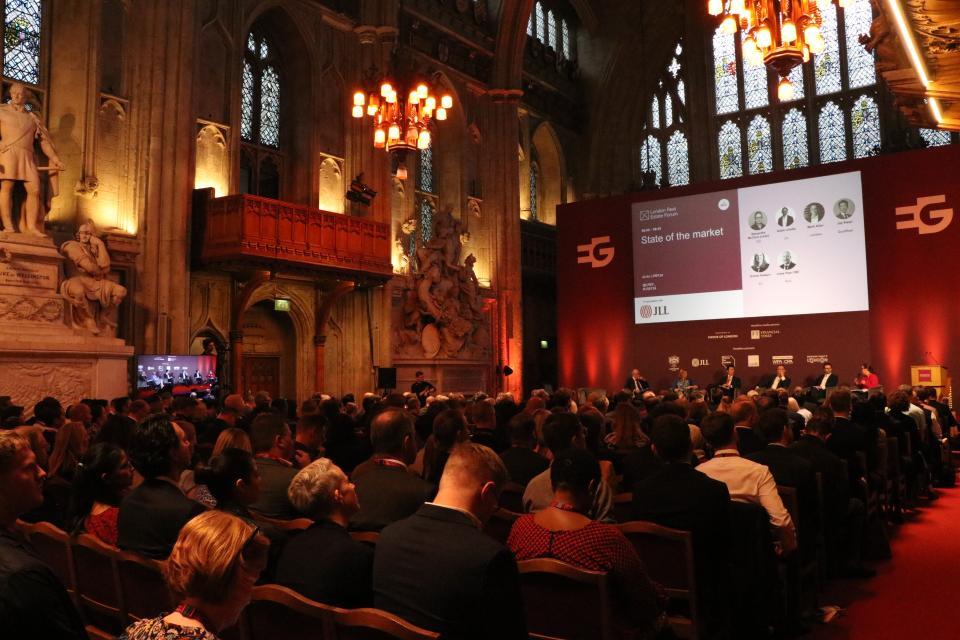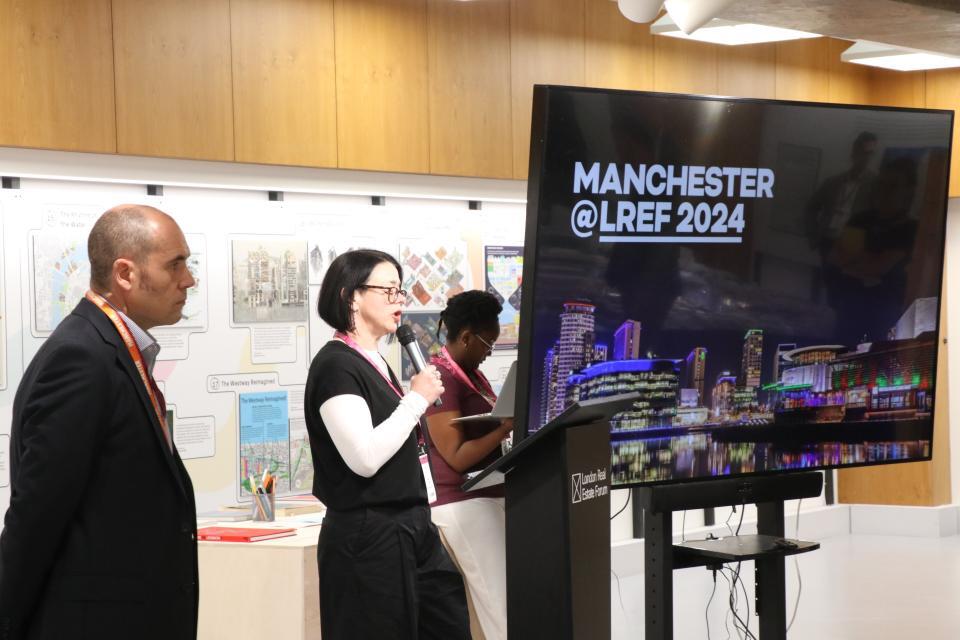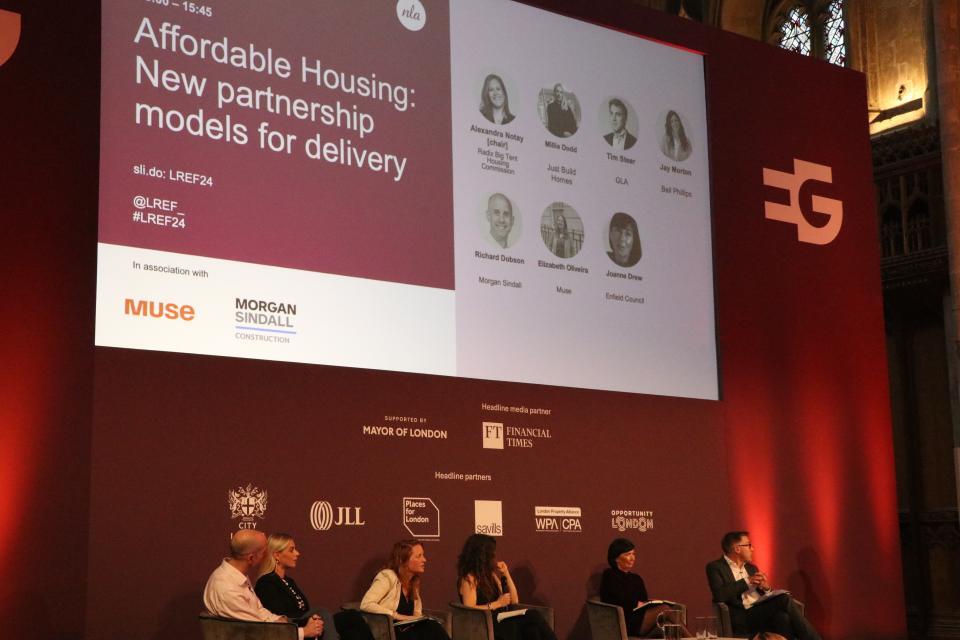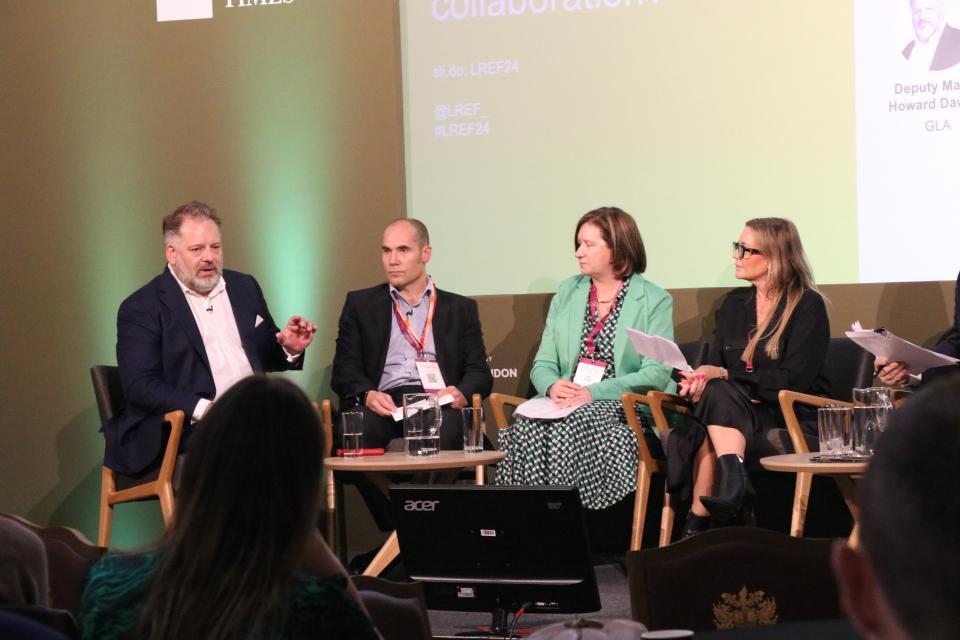Manchester Invest Partnership at LREF 2024
The Manchester Invest Partnership returned to LREF in 2024 to present the region’s investment propositions to leaders in real estate, government and investment. With this year’s conference theme being ‘reimagine’ representatives from Greater Manchester attended in force to discuss how the region has reimagined itself to become a greener, fairer and more prosperous place for all. Here's a round-up of the day:
The Manchester Invest Partnership returned to the London Real Estate Forum (LREF) on Wednesday 25 September 2025 at a brand new venue, The Guildhall, to help position Greater Manchester as a landmark destination for capital investment and FDI through real estate and property.
Attended by leaders from local government, real estate and investment communities, LREF provides the ideal forum to set out the city’s ambitious growth plans and how Greater Manchester can support the future of the UK.
The theme for LREF 2024 is “Reimagine” with discussions geared towards innovative solutions to deliver a more sustainable, equitable and prosperous city under a refreshed national government. Greater Manchester perfectly encapsulates the theme of reimagine; as a region that was regarded as a declining industrial powerhouse not long ago, it is now one of the most dynamic and fastest growing city-regions in Europe. Leaders from the reason, used LREF to present this to other UK cities and investors.
With a devolution deal and long-term strategies in place to deliver housing, equal growth and large-scale infrastructure projects, Greater Manchester has reimagined its future and has laid the foundations for rapid growth which benefits everyone. Attending LREF 2024 allowed leaders from Manchester to show that the region is leading the way when it comes to creating sustainable, value-driven communities and driving transformational growth.
Taking place across five main stages and a series of round tables, LREF provides extensive opportunities for delegates to network and make new connections. By attending with the Manchester Invest Partnership, our annual partners are able to show a strong front for the city and demonstrate the power of our public-private sector relations.
London Investment Forum
To begin the day, Becca Heron, Strategic Director of Growth and Development at Manchester City Council attended the Opportunity London Investment Summit, which was attended by over 100 leading international investors. The leaders discussed opportunities across low-carbon real estate, transport and infrastructure and Becca was able to discuss Manchester’s perspective on this with attendees as well as take away learnings from the capital.
The State of the Market
The conference officially began with the State of the Market session which discussed the current state of the economy and real estate sector, in the dawn of a new government this session proved to be an interesting one.
The panellists discussed the need to build back differently in the face of change, having emerged from the covid pandemic and embracing a new government. They covered the challenges that come with embracing sustainability, technology and rising costs as well as the need to embrace the human experience in real estate but also the opportunities this brings for new thinking and ways of working, including partnerships, collaboration and maximising private capital.

Meet the Delegation Manchester
The highlight of Manchester’s presence at LREF 2024 was a dedicated networking session which allowed members of our partnership to meet with investors, leaders of real estate and national government. This session, hosted by Becca Heron Strategic Director of Growth and Development at Manchester City Council and Andew McIntosh, Director of Place at Greater Manchester Combined Authority, laid out some of Greater Manchester’s most exciting investment propositions. The leaders also discussed the region’s growth journey, showing what is possible in a city-region like Greater Manchester where the private and public sector work together with a shared vision.
During the session, Becca Heron said, “The theme of LREF is reimagine and I’d argue that no city encapsulates that more than Greater Manchester. Underpinning the city’s transformation has been public, private and cross sector collaboration.
"The increasing popularity of Manchester does bring some pressures and challenges. The increasing demand in the housing market is a huge pressure, so we’ve committed to delivering 36,000 new homes by 2032, 10,000 of which will be affordable.
"We also know we have a lot to do to reach our target to become net zero by 2038 and were building sustainability into all of our developments but we need to look at the retrofit challenge and the supporting infrastructure like transport
"I genuinely believe Manchester is at a tipping point and the growth of Manchester is important for the city, Greater Manchester and the UK as a whole."

Andrew McIntosh said “ Looking forward there are opportunities across all 10 of our local authorities. We have an incredibly strong urban core and town centres and we need to utilise those assets.
"We are leading in devolution and we’ve been investing in the GM economy and that’s led to Greater Manchester moving faster than the UK economy.
"We want to drive housing, we see a good, safe and affordable home as essential in Greater Manchester. With our strategic investment framework 'Places for Everyone', we know where we want to develop, we’ve already overcome a lot of the planning barriers the government is facing."
Affordable Housing: New partnership models for delivery
In the afternoon, our partners Morgan Sindall hosted a session all about affordable housing called 'Affordable Housing: New partnership models for delivery' which discussed how the public and private sector can work together to tackle the viability and sustainability issues that come with affordable housing, while keeping in mind the best intersts of the local community. Joining the panel was Richard Dobson, Area Director of Morgan Sindall, Millie Dodd, Senior Communications Manager at Just Build Homes, Jay Morton, Director at Bell Phillips, Tim Steer, Executive Director of Housing and Land at Greater London Authority, Elizabeth Oliveria, Senior Development Manager at Muse, Joanne Drew, Strategic Director of Housing and Regeneration at LB Enfield and was chaired by, Alexandra Notay, Radix Big Tent Housing Commission.

The panel also namechecked Salford City Council and Muse's Passivhaus scheme as an exemplar of low-carbon, affordable housing. Working with the local housing association, this scheme is an example of how the sector can be more innovative to deliver solutions that better suit its people.
Social value: how do we deliver genuine local benefit?
Then Atkins Realis hosted a private roundtable around social value and how the real estate sector can work to truly benefit communities. Becca Heron, Strategic Director of Growth and Development at Manchester City Council joined the private roundtable alongside representatives from Earles Court Development Company, LB Enfield, Barking Riverside, Intelligent Health, Clarion Housing, Quality of Life Foundation, Future of London, Places for London and Greater London Authority.
UK City Leadership – a new phase of collaboration?
Andrew McIntosh, Director of Place at Greater Manchester Combined Authority joined leaders form the UK’s key city regions to discuss how collaboration and partnership is helping them maximise opportunities. In UK City Leadership – a new phase of collaboration, Andrew was joined by Howard Dawber, Deputy Mayor for Business, Growth and Skills at Greater London Authority, Pam Smith Chief Executive of Newcastle City Council, Dee Corsi Chief Executive of New West End Company and Prof Greg Glark, Senior Advisor at NLA.
The panel discussed how the government can best work with cities to maximise investment and support local communities. It also discussed devolution and how to encourage a more joined up approach to knowledge transfer across regions.
When discussing how to work with the new government, Andrew McIntosh said “For us, working in better collaboration with government and moving away from the existing role that they play so they can sit with us and understand and learn how we are deploying it. It’s about how we expand that relationship into a longer-term collaborative approach rather than visiting for 4 hours."
Pam Smith Chief Exec of Newcastle City Council credited Manchester for breaking down barriers when it came to local devolution in UK cities, and allowing other regions to see what is possible.

On connectivity and Greater Manchester's ambitious commitment to the Bee Network, Andrew McIntosh said "Transport is an enabler for growth. The more we can enhance transport connectivity, the more we can expand the talent pool. Without that connectivity you’re trying to cluster skills and talent. The more you can enhance connectivity The more you can grow supply chains. A denser built environment can help the environmental footprint ad compete with European counterparts"
And on planning reform and powers around development, he said: "In Greater Manchester we’re spent the last 8 years developing a spatial framework so we can determine where we want to build and what we want to build in terms of leisure, housing and employment space. In terms of planning issues we’ve been able to remove that as a barrier."
Below are some images from Manchester’s time at LREF 2024: